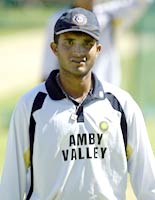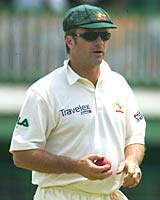With so many one-sided contests, any genuine rivalry in cricket these days is to be welcomed. What is not welcome, however, is media-driven hostility like that which supposedly exists between Steve Waugh and Sourav Ganguly.
Australia and India, the two World Cup finalists and in their own ways the two global powers of the game, meet in Australia this season for an important four-Test series. They are building a healthy rivalry: the celebrated 2001 Test series kicked things off, followed by the meeting in this year's World Cup final. With the Ashes predictable and India-Pakistan contests in abeyance, it is not difficult to see this growing as India gets tougher. But it could do without what to date has been a largely manufactured enmity between the two captains.
Along with Stephen Fleming and Nasser Hussain, Waugh and Ganguly are two of the four most senior captains on the scene in these turbulent post-World Cup times, and they certainly have the most interesting history. With their Test clash on the horizon, and a tri-series tournament in India in November before that (India have just one three-day tour match and, bizarrely, a one-day fixture between the tri-series final on November 18 and the start of the first Test in Brisbane on December 4), it would not surprise that, given the history, relatively innocent remarks are interpreted as jibes.
 "The Aussies must remember that they have not played well in India in recent times," Ganguly was quoted as saying by PTI on Monday, gently dipping his toe in the psychological water. "They lost the Test series in India in 2001. If we happen to meet in the final of the tri-series, they will have a battle on hand."
"The Aussies must remember that they have not played well in India in recent times," Ganguly was quoted as saying by PTI on Monday, gently dipping his toe in the psychological water. "They lost the Test series in India in 2001. If we happen to meet in the final of the tri-series, they will have a battle on hand."
These are mild statements of fact which, come November, are likely to be interpreted as antagonism. Australia have actually not played well in India for 30-odd years, since Bill Lawry's disaffected tourists won in 1969, though they play one-day cricket well anywhere and their most recent series in India was a 3-2 success on the heels of an epic Test series loss.
Given their history, one might have expected some jousting from Waugh along these lines. Yet just two days earlier in Kolkata -- on a visit to India for charity and sponsorship work -- Waugh was remarkably conciliatory in commenting on Ganguly.
"His captaincy has direction and he enjoys his team's respect," Waugh was quoted as saying by CricInfo. "Captaincy calls for tough decisions and he doesn't go for soft options. Under his captaincy, the boys seem to be enjoying a fight. There's a new toughness in the current Indian side."
One dare not suggest that Waugh, 38 last month, is becoming docile in his "old" age. Or indeed suggest that 38 is old for a cricketer. Or even mention the word age, for fear or prompting more shibboleths on its irrelevancy. Waugh is likely being respectful on Ganguly's home turf. But if genuine ill-feeling existed, he surely would not be so generous.
Waugh's magnanimous comments are certainly in contrast to the alleged Australian perception of India as mentally soft, which would not have changed after their World Cup meetings. At the moment, Waugh would appear to be letting down his side of the bargain. It's the off-season, though, so his psychological form may be a little scratchy. Watch out for the anti-Ganguly stories in Australia's tabloids in the months ahead.
The Waugh-Ganguly contretemps, such as it is, began in February 2001, when Waugh reacted critically to reports the Indian board had ordered slow tracks prepared for Australia's tour, and Ganguly then criticised Waugh's right to make such judgements from back in Australia, in the process playing down Australia's winning streak. This was probably little more than an over-sensitive misunderstanding on Waugh's part, and a projection of pre-series confidence by Ganguly. It was quickly seized upon, however, and Ganguly's "antics" then became an Australian media theme of the tour, culminating in the apparently fabricated "toss incident" in the third one-day international.
In his 2001 diary, Waugh made both positive and negative assessments of Ganguly, writing that "there's no denying we've found him to be an unusual, often niggly opponent" but that "the bottom line for me is that the cricket has been tough, passionate and competitive. And enjoyable, too."
 Waugh admitted he did not get on with Ganguly during the tour, said there were times the Australians felt he was childish, regarded him as a serial offender when it came to pre-match protocols, and felt he became a 'protected species' with the umpires, putting pressure on the local officials. For all that peevishness, however, Waugh was encouraged by Ganguly's presence in the Australian rooms after the one-day series, writing "I couldn't help but thinking it was a great pity that we hadn't made a move in this direction much earlier", and that "there is no doubt he is a very competitive cricketer and knows what he wants to get out of the game". Therein may lie the root of the problem, for Australia is not accustomed to facing confrontational Indian captains, and continue to be prone to reacting poorly when any opponent irks them or replicates their tactics. But it does eventually draw respect, as we've seen.
Waugh admitted he did not get on with Ganguly during the tour, said there were times the Australians felt he was childish, regarded him as a serial offender when it came to pre-match protocols, and felt he became a 'protected species' with the umpires, putting pressure on the local officials. For all that peevishness, however, Waugh was encouraged by Ganguly's presence in the Australian rooms after the one-day series, writing "I couldn't help but thinking it was a great pity that we hadn't made a move in this direction much earlier", and that "there is no doubt he is a very competitive cricketer and knows what he wants to get out of the game". Therein may lie the root of the problem, for Australia is not accustomed to facing confrontational Indian captains, and continue to be prone to reacting poorly when any opponent irks them or replicates their tactics. But it does eventually draw respect, as we've seen.
If the depth of Waugh and Ganguly's antipathy was questionable at the time, it became even more so in July last year when Waugh, again in India, praised Ganguly for his leadership qualities and toughness. Instilling toughness, love of a fight, backing his players to succeed these are attributes of Ganguly's captaincy he shares with Waugh, and which Waugh, unless he's lying through his teeth, evidently respects in an opponent.
It is possible that by early 2004, one of Waugh or Ganguly will no longer be captain of his country. With expectation high following a good World Cup, it's not inconceivable that a disastrous tour of Australia mirroring that in '99/'00 could lead to calls for Ganguly's replacement, while an upset home loss to India in an era of spectacular successes would almost certainly hasten the departure of Waugh, whose future is debated series-by-series anyway.
In background, personality and batting style they are disparate cricketers, but Ganguly and Waugh's leadership is not without similarities. As India and Australia build on their potential on-field rivalry in the months ahead, it would be a shame if it were spoiled by media-driven pettiness between the two leaders.






